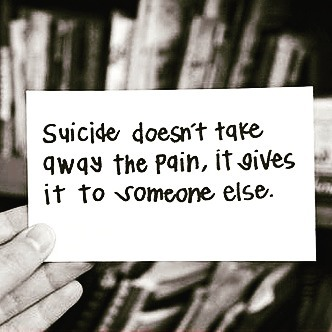 This is something that I feel quite strongly about. Both of my parents have tried to commit suicide when I was young, at different times and stages of my life. The first one was when I was about 11 and I don’t remember too much about it, there was a lot of pain flying around the family at that time and I was probably shielded from the details. The second parent (by then long divorced from the other parent) tried when I was 21 and away at uni in a different city. That one I remember vividly, even though I wasn’t there.
This is something that I feel quite strongly about. Both of my parents have tried to commit suicide when I was young, at different times and stages of my life. The first one was when I was about 11 and I don’t remember too much about it, there was a lot of pain flying around the family at that time and I was probably shielded from the details. The second parent (by then long divorced from the other parent) tried when I was 21 and away at uni in a different city. That one I remember vividly, even though I wasn’t there.
My reactions to the second were still those of a child. Perhaps when it’s a parent, one’s reactions are always those of a child. For me the most devastating thought was a purely selfish one (as fits a child) “Do I mean that little to them? Am I not even worth staying alive for?” The pain of that thought was overwhelming.
At the time I was young, saw myself as an optimist and simply could not relate in any way to the amount of pain that would bring one to such an action. I was angry. I described suicide as “the most selfish act anyone could do”.
Now decades of time and a world of life experience later, I have stared into that dark abyss myself and I know the pain that leads one there. I know how all-encompassing the pain and darkness seems and how the needs of others fade. An end to the pain is all one wants and it seems inconceivable that one’s life has any relevance any more. In fact, one can even argue to oneself that others would be better off without one there.
In those dark times it was the certain knowledge of that pain I had experienced myself as one (almost) left behind that kept me from that road more firmly than anything else. By then I was a parent myself and there was just no way I was going to send my children the message that they meant so little to me they were not even worth living for. Although living seemed to be the hardest thing I could do, there was no hesitation that they were worth it.
And beyond the children there are always others. Others who will be affected by a suicide, no matter of whom. None of us is truly alone. We all have parents, we may have siblings. Even if all our family is gone and we feel we have no friends, it is likely that there are people who care. The person at the corner shop from whom you buy milk on weekends and who may think “should I have known? Is there anything I could have done?” Even if you can argue that there is no-one that would notice or care, let’s be frank, someone is going to have to deal with the body and winding up of financial and other affairs. And I’m sure it’s really going to make their day!
Whenever I hear about trains being delayed because of incidents on the track I am immediately concerned for those on the train, not least of all the drivers. What have they ever done to that person to deserve the images that will now be impossible to erase from memory, which will haunt their nights and dark moments and which may lead them to require therapy.
There are many people, working for many organisations, some sitting at telephones in shifts 24 hrs a day, who want more than anything else to help people wrestling with these dark issues. They care. They really do. About everyone.
Help is always available. So let’s all acknowledge that suicide Always causes pain to others.



